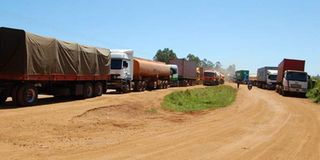Single customs clearance system hangs in balance

Trucks in a queue at the Uganda-Kenya border in Malaba. FILE PHOTO
Kampala- Clearance of imports from the first point of entry, particularly at the port of Mombasa in Kenya, may not happen as earlier scheduled, prompting the tax body to temporarily halt its enforcement, the Daily Monitor has learnt.
However, Uganda Revenue Authority (URA) says there is no need for panic, stressing that collection of revenues accrued from Uganda-bound cargo will be rolled out in October as per the regional heads of State agreement.
But local port users, among them importers, told the Daily Monitor that by now, the single custom territory should have been up and running following URA’s assurances that by this time, the enforcement would be underway.
The single customs territory is meant to facilitate clearance of goods and also speed up assessment and collection of revenue.
The rush to roll out the single custom territory was prompted mid this year after the three presidents—Mr Museveni (Uganda), Mr Paul Kagame (Rwanda) and Mr Uhuru Kenyatta(Kenya) endorsed the initiative in Kampala-Uganda, paving way for its implementation which URA had scheduled for August last month.
However, the initiative is not being rolled out as users/industry players demand for more time to understand how the operation will impact on them.
“We still need to be educated more on how the single custom territory will work,” the Kampala City Traders Association chairman, Mr Everist Kayondo, whose members are largely importers, said in an interview yesterday.
He added: “Our major cause of contention is the security of our imports both at the port and on transit. If this can be properly guaranteed, then our members will.”
Importers are also suspicious of the minimal involvement of Tanzania and Burundi, leaving them to question whether this arrangement is meant for the three countries or the five partner states.
Benefits of the single customs
• Increase revenue collection through easier payment systems
• Reduce clearance costs and multiple bond securities
• Remove checkpoints along the Northern Corridor




